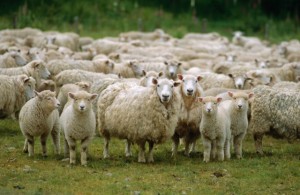Several years ago, a student asked me where I lived. Upon hearing my house was in the country, he looked at me, eyes wide, and in an alarmed voice implored, “You shouldn’t live there, Miz Hartley!”
Bewildered, I asked him why.
“Because,” he replied. “Sheeps live in the country, and some sheeps is mean.”
I chuckled then, yet now in hindsight think he may have been on to something.
Some sheeps is mean.
Now you may be thinking that sheep could be called cute, fuzzy, timid, or perhaps even stupid. But, mean? Honestly, I had never considered sheep to be particularly vicious. The child must have had sheep confused with those aggressive, little pigmy goats that greedily jump on children in petting zoos. Or had he?
Some sheeps is mean.
Perhaps more precisely – sheeps is mean.
The metaphor of God’s people as sheep is well known throughout the Old and New Testaments. We are the “people of his pasture, and the sheep of his hand.” Jesus is the “good shepherd”, and we are reminded that it is because of his role in this capacity that he gave up his life for his sheep.
So where does this leave us? Did Christ rescue us because of our cuddly, innocent nature? Of course not! Cute and fluffy as sheep might appear from afar, truth is if you get close enough they will be revealed for the often dirty, matted, smelly creatures they are. Flocking together to survive, they hoard the grass upon which they graze, consuming it to the very root, even while trying to take over territory from other sheep who, in their minuscule brains, are sure to be gorging themselves on more delectable morsels.
Yes, sheeps is mean.
Blessedly, however, the metaphor does not leave us here, for Christ himself did not and does not leave us here. In 1 Corinthians 6, Paul writes to the church in Corinth about the grievances and disputes among her members. He cautions them about all sorts of sin, listing everything from sexual immorality to greed, but then ends with this statement in verse 11: “And such were some of you. But you were washed, you were sanctified, you were justified in the name of the Lord Jesus Christ and by the Spirit of our God” (emphasis mine). And that, dear lambs, is the point. Though we are, by nature, “mean sheeps”, once lost. We are now his sheep, for Jesus Christ the Good Shepherd not only called to us, searched us out, laid down his life for us that we might enter the sheepfold through him, he also has begun the work of our sanctification as we dwell with him within the fold.
Sadly, it seems increasingly popular these days to discount the Shepherd because of the sheep. Even among professing believers, the Church is often maligned. Some justify withdrawing from the fold by pointing to the failings of the flock. But, we would be wise to remember, never is a sheep more vulnerable than when it leaves the sheepfold. Why should it be any different for Christ’s lambs? The Church is not comprised of wolves in sheep’s clothing. No, we are sheep in sheep’s clothing, and we need our Shepherd to wash us, to feed us, to care for us. A shepherd with but one lone sheep would be a poor one at best. But our Shepherd is rich beyond measure and desires his flock to be the most glorious of all. And so, perhaps it all boils down to a matter of humility.
Admitting we are but sheep – sometimes even mean sheep – who collectively are in need of a Shepherd
“For you were straying like sheep, but have now returned to the Shepherd and Overseer of your souls.” 1 Peter 2:25
